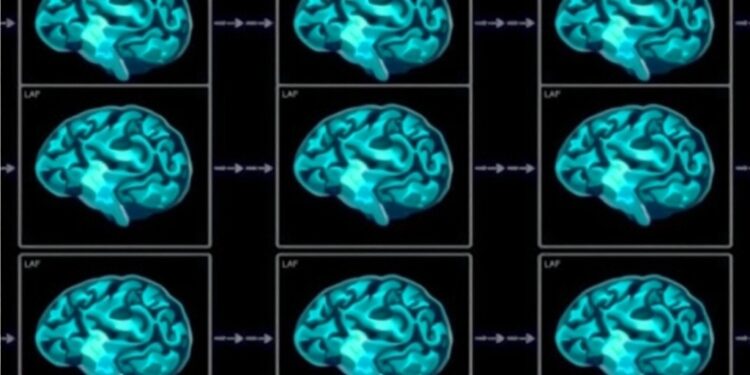Challenging Long-Held Assumptions: Infant Memory Study Reveals New Insights
In a groundbreaking development, researchers have leveraged functional magnetic resonance imaging (fMRI) technology to uncover the capabilities of memory in infants as young as 12 months. This innovative study proposes a paradigm shift in our understanding of infant memory, particularly focusing on the perplexing phenomenon of infantile amnesia. Until now, it was widely believed that the inability to recall events from early childhood stemmed from the underdeveloped state of the infant brain, particularly the hippocampus. However, this new research argues that such memory gaps may instead arise from retrieval failures rather than an inherent inability to encode memories.
The concept of infantile amnesia describes the nearly universal inability of adults to recollect specific incidents from their early years, particularly from birth to about three years of age. This enigmatic condition has puzzled psychologists and neuroscientists alike, leading to various theories concerning its underlying mechanisms. Historically, the focus has been on the developmental maturity of the hippocampus, a critical brain structure responsible for the encoding and retrieval of episodic memories. Early studies led researchers to believe that until the hippocampus reached full maturation, infants would struggle to form lasting memories.
However, research conducted in different species, particularly in rodents, has presented a compelling counter-narrative. Evidence suggests that memory traces can be created in the infant hippocampus, which raises questions about the nature of memory accessibility over time. The findings from these animal studies indicate that, although memories may be formed during infancy, they often become inaccessible as time passes. This situation prompts inquiries into how and why these early memories are lost rather than questioning the capacity of infants to make memories in the first place.
Infants exhibit memory through various behavioral indicators. For instance, they can demonstrate conditioned responses and engage in imitation, as well as recognize familiar faces and objects. However, an ambiguity remains regarding which brain structures are involved in these memory processes. Is it the hippocampus, or does this function rely on alternative neural pathways? The recent study by Tristan Yates and his colleagues aimed to clarify this question by directly examining the neural mechanisms at work in infants during memory tasks.
The researchers enlisted a sample of infants aged between four to 25 months and utilized fMRI technology to scan their brains while they participated in memory tasks involving visual stimuli like faces and scenes. The experimental design was guided by well-known methods used to assess memory in adults but was adapted for the infant demographic. Following the exposure to images, infants underwent a memory test that measured preferential looking— a behavior indicative of memory retention— while their brain activity was closely monitored through neuroimaging.
The results of this meticulously conducted research were striking. The data presented strong evidence supporting the notion that the infant hippocampus is indeed capable of encoding individual experiences beginning around the age of one year. This suggests that infants possess the fundamental cognitive abilities necessary to form memories, challenging the long-held belief that such capacities do not emerge until later in development.
Additionally, the findings indicate that, while infants can encode memories, these memories may not be readily accessible without specific retrieving cues. This conclusion aligns with results from prior rodent studies, which also demonstrated that early memories could persist into later life but often remained dormant without appropriate stimuli. Thus, the implication is clear: infantile amnesia may not be about a lack of memory formation; rather, it points to an intricacy within the retrieval mechanisms necessary for accessing these memories as individuals mature.
In light of these findings, researchers posit that the understanding of how memories are formed and recalled during infancy requires a reevaluation. The presence of encoding mechanisms for episodic memory during the early years, despite their seemingly transient nature, leads to the conclusion that our earliest memories might be more intricate than previously appreciated.
As the fMRI technology continues to advance, researchers are likely to uncover further complexities associated with memory in infants. The nuances of memory retrieval and the functionality of the hippocampus in the context of human development may provide new avenues for understanding how individuals construct their early life narratives.
Moreover, this research has broader implications for understanding memory disorders that arise due to trauma or other psychological barriers. By establishing a clearer view of how memories are encoded in infancy, there may be potential for developing targeted therapeutic interventions aimed at improving memory retrieval in adults who suffer from memory-related issues stemming from their childhood experiences.
Ultimately, this study not only contributes to the growing body of literature surrounding cognitive development in infants but also evokes a profound appreciation for the capabilities of the young human brain. It highlights the importance of continued exploration into the cognitive processes that begin in infancy and evolve throughout an individual’s lifetime.
The scientific community eagerly anticipates further investigations that can expand on these findings, paving the way toward a more comprehensive understanding of memory formation, retention, and retrieval across various stages of human development.
Thus, this cutting-edge research opens new dialogue regarding the foundational elements of memory in early life and reminds us that the human brain’s capabilities, even in infancy, are far more complex than we may have ever realized.
Subject of Research: Infant Memory and Brain Development
Article Title: Hippocampal encoding of memories in human infants
News Publication Date: 21-Mar-2025
Web References: DOI link
References: Not provided
Image Credits: Not provided
Keywords: Infant memory, hippocampus, infantile amnesia, memory retrieval, fMRI, cognitive development, neuroscience




